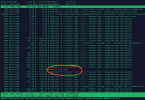I also delight in proving myself wrong too, especially as in this case this would be of benefit to me, I own several of these https://www.kingston.com/datasheets/SEDC2000B_en.pdfand these have a TBW lifetime that is worse than these without PLP https://www.seagate.com/content/dam...firecuda-530-ssd-DS2059-5-2310-AMER-en_US.pdf
i.e whatever it is that determines nvme lifetime - it is not PLP,
I believe its whether there is a DRAM cache on the drive or not that makes the difference.
yes and without PLP data gets lost in case of a power outage. Thus drives without plp needs to write to the drive before they report a finished write. Drives with plp can give their confirmation as soon as the data is on the cache: Better performance and less writings.
At least that's my understanding from the mentioned thread. In fact the OP made a similiar Argument to yours which is reason I'm not convinced on it after rereading staff members counter arguments
Last edited:


